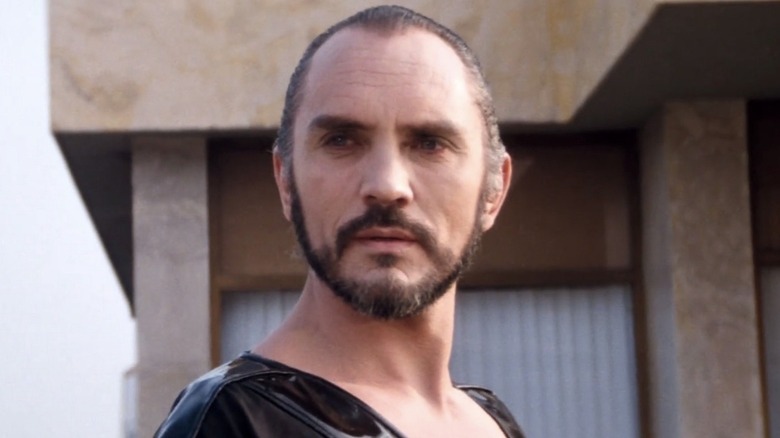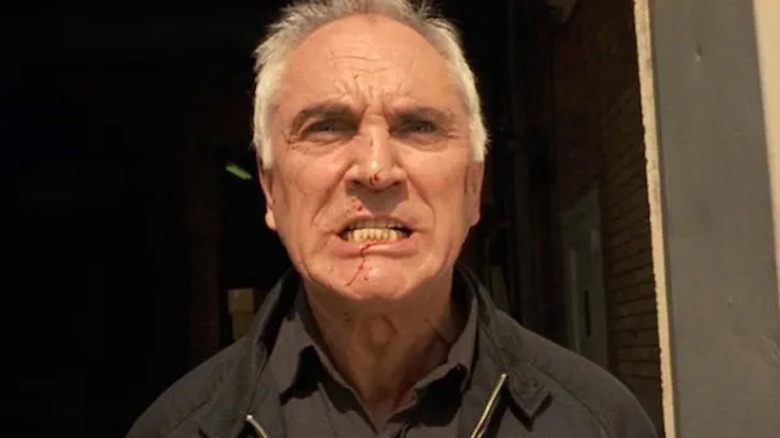Kneel Before Terence Stamp, A Brilliant And Beautiful Actor Who Played Superman's Mightiest Foe
Terence Stamp was in danger of disappearing in the late 1970s when he landed the role of General Zod in Richard Donner's "Superman." The Kryptonian menace, who gets condemned to an eternity of misery in The Phantom Zone, exploded with a nationalistic, genocidal, Hitler-esque intensity. He believes in the racial superiority of Kryptonians and pleads with Jor-El (Marlon Brando) to commit to the preservation of their endangered race. Jor-El is a principled man who wants nothing to do with Zod's eugenicist conquest. Zod, however, assures Jor-El that should he ever break free of the Forbidden Zone, he will enslave his Kryptonian bête noire's offspring.
This was my introduction to Terence Stamp, and it drew blood. Gene Hackman's Lex Luthor was a cartoonish villain who felt eminently conquerable for Christopher Reeve's Superman. But when Stamp returned for "Superman II" (a Frankenstein's monster of a production that was completed by director Richard Lester, who added a dollop of roughly ADR-ed broad comedy to a film Donner hadn't been allowed to complete), the Stepney, London native brought the physical threat that Hackman's Luthor failed to convey in the first film. Superman seems like a defeated man as the Phantom Zone escapee barks, "Come to me, son of Jor-El. Kneel before Zod!" And it's only via a deftly deployed trick that Superman defeats the formidable Zod.
I was a pre-teen child when I saw the first two Reeve Superman films in theaters, which means I watched them dozens of times once they hit home video and (commercial-free) pay cable. There was a point at which I could quote both films from start to finish, and I eventually came to relish Stamp's performance. I had no idea that he was closing out a decade that hadn't treated him well. I didn't know that he'd once turned down the opportunity to play James Bond. And I certainly hadn't a clue that he'd been, for a time in the 1960s, one of the coolest people associated with the British Mod scene — though Stamp was way more than mod. He'd dated Julie Christie, and they formed one half of a Swinging London "It" couple until Stamp moved on to supermodel Jean Shrimpton.
Terence Stamp was a beguiling sex symbol who was at home in superhero movies and crime flicks
Discovering Stamp — all he contained, all he accomplished, and all he held back — over the next four decades was an invigorating experience. He was stunningly singular and dead, dead sexy. I'd like to think he could've been a bigger star, but I'm also grateful he never got shoehorned into more than a few lousy movies as a lead. For the most part, when Stamp appeared, he belonged and the movie immediately became worth our time and attention.
I didn't begin to get a measure of Stamp as an actor until my high school English teacher, Joyce Rucker, screened Peter Ustinov's film version of Herman Melville's "Billy Budd." I got it fairly quickly. Our classroom turned into a sauna. There was swooning and cis-het aspiring, but Stamp was impossible. We could never have that, nor could we be that. Ustinov's "Billy Budd" is not a conventionally sexy film (it is, after all, directed by Ustinov, who was to eroticism what Chris Dudley was to free-throw shooting), nor is William Wyler's "The Collector," but you came away from both craving more Stamp.
Stamp was imposing in his "Superman" movies, and a tough, blue-eyed avenger in Steven Soderbergh's "The Limey." But those performances become less interesting (though no less effective) when you factor in the psychological complexity of his 1960s work in Pier Paolo Pasolini's "Teorema," Ken Loach's "Poor Cow," and his portrayal of an alcoholic actor in Federico Fellini's "Toby Dammit" (a piece of the arthouse anthology "Spirits of the Dead").
Post-Zod, "The Limey" excepted, Stamp strategically allowed himself to be used. He's complicit and fully engaged in Stephen Frears' "The Hit", Michael Cimino's "The Sicilian," and Frank Oz's "Bowfinger," and, upon entering the entering the last stage of his career, he was a blast in Peyton Reed's "Yes Man" and George Nolfi's "The Adjustment Bureau." I'm so happy his countryman Edgar Wright got Stamp for his swan song, "Last Night in Soho," where Stamp played a silver-haired ghost.
From his very first performance, Stamp haunted us. We loved him as Zod, but we fell in love with him, against our better judgment, in films like "The Collector." I can't really quantify Terence Stamp, but I will forever welcome him into my dreams ... or nightmares ... or those enchanting spaces in between.
And as long as I gaze on "Waterloo Sunset," I'll be in paradise.

